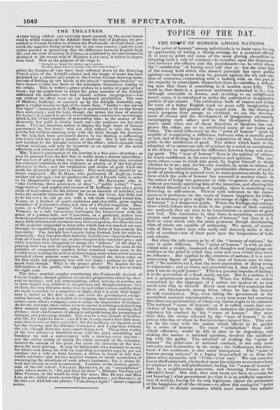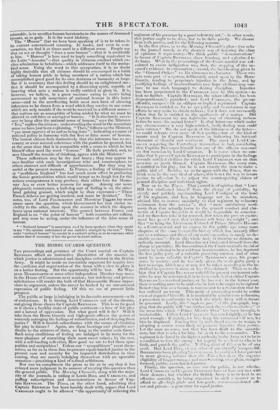TOPICS OF THE DAY.
THE POINT OF HONOUR AMONG NATIONS.
" THE point of honour," among individuals, is to insist upon having an opportunity of taking a bloody revenge for a personal affront. It is easy to point out some of the most glaring absurdities in adopting such a rule of conduct—to moralize upon the'dispropor- tion between the offence and the punishment—to be witty about the " satisfaction " of having one's self shot at : but the mere fat of the strong hold which this absurd principle has upon public opinion—so strong as to keep its ground against the wit and wis- dom of centuries, cooperating with a lurking wish on the part of the majority to emancipate themselves from it—satisfies a reflect- ing man that there is something in it besides mere folly. The truth is, that there is a generous sentiment embodied in it ; that although untenable in reason, and revolting to an enlightened moral, sense, it is calculated to strike thecesthetical or imaginative portion of our nature. The cultivation both of reason and (what for want of a better English word we must call) imagination is requisite to the full growth of the moral man. In the history of man's progress from savage to civilized, we see the develop. meat of reason and the developmsnt of imagination alternately outstripping each other ; and to the ill-adjusted balance of man's mind when one of these functions or faculties has out- grown the other, are to be attributed many of our faults and follies. The mind influenced by the " point of honour " must be capable of recognizing a difference between what is morally good or bad, and of feeling shame in the imputation of bad, honourable pride in the attribution of good. The defect which leads to the adoption of an erroneous rule of conduct by a mind so constituted, is the failure to apprehend the difference between being and seem- ing good. The " man of honour" lives in the opinion of others ;. he wants confidence in his own impulses and opinions. The mo- ment others cease to think him good, he begins himself to doubt whether he is so; and, for his own comfort, he seeks to silence all detractors by intimidation. The questionable character of such a mode ofproceeding is painted over, to more generous minds, by the form which the code of honour Juts assumed in modern times : in the notion of' being too generous to take vengeance of any enemy without previously apprizing him of the intention, and allowing him to defend himself on a footing of equality, there is something very flattering to self-esteem. Viewed with reference to the conse- quences it produces—in the waste of human happiness for trifles, and its tendency to give might the advantage of right—the "point of honour" is a dangerous guide. When the feelings and concep- tions which induce men to make it the polar-star of their conduct are analyzed, they are seen to be inconsistent—a mixture of good and bad. The conclusion is, that there is something essentially vicious and unsound in the " point of honour," but that it is a fault or error which only the more generous though domineering class of minds are capable of embracing. We speak, of course, only of those better men who really and sincerely make it their rule of conduct—not of their poor apes the frequenters of hells and saloons.
But when the talk comes to be of the " honour of nations," the case is quite different. The " point of honour" is with an indi- vidual man a reality, inasmuch as all thoughts and imaginings are realities to the mind in which they exist and over which they exert an influence. But applied to the concerns of nations, it is a mere unmeaning figure of speech. The man of honour says to him- self', " So sensitive am I, that the mere hnputation of doing wrong is unbearable ; and so brave and powerful am I, that with my own arm I can do myself justice." This is a genuine impulse of feeling ; it is the perversion of a frank manly nature. But in a nation, it is not a spontaneous genuine feeling. When the follies or crimes committed by time aggregate of a nation are spoken of, no man needs take that to himself. Every man must feel conscious that there are blackguards among those whom he has the honour to call countrymen. Nay, even taking the government as the accredited national representative, every man must feel conscious that there are governments of whom any nation ought to be ashamed. The national " sense of honour," as it is called, wants that con- viction of' being in the right, which animates the individual who regulates his conduct by his " sense of honour." But more than this, the victim selected by the "man of' honour" is the person who has or whom he fancies to have injured him. This can- not be the case with the nation which affects to be guided by a sense of honour. To exact " satisfaction" from indi- vidual offenders, would be felt at once to be .degrading; and making the matter a national question, involves the unoffend- ing with the guilty. The mischief of making the "point of honour" the polar-star of national conduct, is not only more extensive and destructive in its range ; the hollowness, the false- hood of the sentiment, is also more transparent. The "point of honour among nations," is a legacy bequeathed to us from the times when monarchs said " l'etat—c'est moi." We can conceive Louis the Fourteenth, wh o looked upon his subjects as creatures born to minister to his self-glorification, feeling his "sense of honour
hurt by a neighbouring potentate, and throwing France at the- offender's head. But now, that men know (or have no excuse for
not knowing) what government is—that it is an artificial organiza- tion of society, having for its only legitimate object the promottom of' the happiness of all the citizens—to allow this analogical "point of honour" to dictate measures which must render two nations
miserable, is to sacrifice human hecatombs to the manes of deceased tyrants, as to gods. It is the worst idolatry.
The " hIlmour" that we have been speaking of is to be taken in
its current conventional meaning. In books, and even in con- versation, we find it at times used in a different sense. People say that an act or thought " does a man honour"—that it is creditable to him. " Honour" is here used to imply something equivalent to
the Latin " honestas"—that quality in virtuous conduct which ex-
cites admiration in beholders—which addresses itself to the aesthe- tical sense. Using the word in this acceptation, it is no doubt highly desirable that all citizens should be encouraged in a habit of taking honest pride in being members of a nation which has
-accomplished great good tiff its own denizens- or humanity at large.
But it is necessary that this feeling should be an enlightened one;
that it should be accompanied by a diseetning spirit, capable of
knowing what acts a nation is really entitled to glory in. It is, however, we believe, in a great measure owing to men's being
accustomed to talk sometimes of national honour in this latter sense—and to the unreflecting habit most men have of allowing inferences to be drawn from a word which they receive in one sense which are only tenable if the word be received in a different sense— that nations are so susceptible of being misled by what we must be allowed to call false or analogical honour. "It is absolutely neces- sary to keep alive the national sense of honour," says the Minister. "Yes," replies the citizen ; understanding the word in the secondary sense we have just been esplaining. "Then," thllows up the Minister, "you must approve of so and so being done"; indicating a course of national policy in harmony with the first or false sense of honour. The honest citizen feels instinctively that the inference has no ne- cessary or even natural coherence with the position he granted, but at the same time that it is compatible with a sense in which he has himself often used the word "honour." He feels puzzled, and, to save himself the trouble of thinking, agrees with the Minister.*
These reflections may be dry and heavy ; they may appear to men familiar with such investigations trite and commonplace, to others abstract and difficult of apprehension. But they may be useful at the present moment. In France, a feeling of indignation at "perfidious England" has had much more effect in producing the heroic gesticulation which would tempt us to laugh but fir the serious consqeuences it may produce, than either love for NIEns- strr Am or even better reasons for anger. Among our more phlegmatic countrymen, a bull-dog sort of feeling is on the other hand gaining ground, which might be thus expressed—" These French fellows are getting insolent, and must be drubbed." The
notes, too, of Lord PALMERSTON and Monsietir Tiussas lay more
stress upon the question, which Government has first shown in- civility to the other, than upon the manner in which the dispute bears upon national interests. The quarrel between France and England is on "the point of honour": both countries are talking, and may soon be acting, under the influence of the Use sense of' honour.
* " National honour" is sometimes used by loose speakers when they ought to say "the opinion entertained of one nation's strength by the rest." They make "national honour" to consist in a nation's acting so as to convince other nations that if necessary it has the power to exact redress.



























 Previous page
Previous page